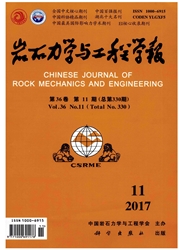

 中文摘要:
中文摘要:
岩体质量分类是各类岩土工程实践问题的基础,由于岩体指标参数的模糊性和随机性,故岩体质量分类表现出不确定性,而现有分类模型则忽略了这种参数不确定性对分类结果造成的影响。考虑到分类指标参数的不确定性,在岩体质量分类问题中引入概率描述的可靠度分析方法,提出一种蒙特卡洛模拟(Monte Carlo simulation,简称MCS)和逼近理想解排序法(technique for order preference by similarity to ideal solution,简称TOPSIS)耦合模型。该模型由两部分组成:通过博弈论赋权方法获取分类体系中指标的权重,并结合TOPSIS模型来建立可靠度分析中的极限状态方程;基于MCS方法由TOPSIS模型构建的极限状态方程进行随机的不确定性分析,并通过概率函数给出最终的分类结果。通过25组测试样本对基于博弈论组合赋权的TOPSIS模型进行测试,结果显示该模型的误判率为0,表明MCS-TOPSIS模型中确定性分析的合理性。最后通过Matlab语言编制计算程序,分别由确定性分析和不确定性分析的角度来探讨水布垭地下洞室厂房围岩质量分类。研究结果表明:采用MCS-TOPSIS模型进行岩体质量分类是可行的,该模型具有较高的准确度且易于实现,具有一定的工程应用价值。该研究为岩体质量分类提供了一种新思路。
 英文摘要:
英文摘要:
The quality classification of rock mass is a basic geotechnieal engineering issue. The classification of rock mass quality shows the uncertainty due to the fuzziness and randomness of the rock mass parameters. The effect of parameter uncertainty on the classification results is ignored in the existing classification model. The reliability method was thus introduced into the classification of rock mass quality, and a coupled model of Monte Carlo simulation(MCS) and technique for order preference by similarity to ideal solution(TOPSIS) was proposed, which can consider the effect of the parameter uncertainty on the classification. The model consists of two parts. One part is to obtain the weight of classification system index with the game theory and to determine the limit-state equation of the reliability with the TOPSIS model, and the other part is to perform uncertainty analysis and to provide the final classification result based on the probability function. The TOPSIS model was tested with 25 sets of samples. The analysis results of the MCS-TOPSIS model indicate that the misjudgment ratio of the model is 0. The quality classification of the surrounding rock at Shuibuya underground powerhouse is examined based on the certainty and uncertainty methods using Matlab programs. The results demonstrate that it is feasible to use the MCS-TOPSIS model to classify the rock mass quality and the model has high accuracy and is easy to use.
 同期刊论文项目
同期刊论文项目
 同项目期刊论文
同项目期刊论文
 期刊信息
期刊信息
